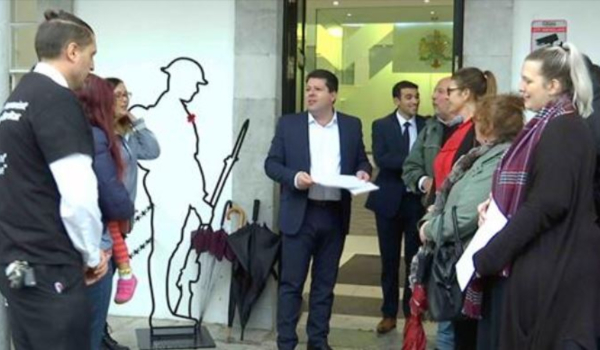
Over the past few months, there has been a consultation by the government of Gibraltar, which is a British Overseas Territory, but is not covered by the abortion law of Great Britain. The reason for the consultation is that the judgment of the UK Supreme Court in regard to the abortion law of Northern Ireland will also affect Gibraltar, whose law is not compliant. The consultation document proposed a very narrow reform of the law. Pro-choice groups in Gibraltar connected with groups in the Voice for Choice coalition in the UK and elsewhere, many of whom made submissions to the consultation.
All of Gibraltar’s pro-choice groups gathered on 22 November to submit a joint statement as well as submit their individual groups’ submissions to the Chief Minister. Their submissions can be found at:
No More Shame
https://www.scribd.com/document/393972996/NMS-Command-Paper-Response
Abortion Support Network
https://docs.google.com/document/d/1_kYIvh9o_zZz4sp5Pj8vT0pfSc5LXiUxcai7ZJyE89k/mobilebasic
Choice Gibraltar
Together Gibraltar
https://www.facebook.com/747934725413071/posts/1015220808684460/
They also notified the press and GBC News. The latter posted a report on Facebook that said:
“All of Gibraltar’s pro-choice groups have agreed on five main points which they believe the government needs to address. They call for the removal of the life sentence penalty, and for the legalisation of informed terminations up to 14 weeks. They also call for the removal of the onus on stating mental ill-health in order to access terminations. The groups add they want women to be allowed to choose their preferred medical practitioner, and for provisions to be made for a seamless service in the event of a conscientious objection.”
Two Birmingham UK Law School academics, Fiona de Londras and Máiréad Enright, responded with six main points:
- Make lawful abortion available without restriction as to reason up to 14 weeks.
- Make lawful abortion available after 14 weeks where there is a risk to the health of the pregnant person and termination would reduce or mitigate that risk.
- Make lawful abortion available without time limit where there is a risk to the life of the pregnant person or the foetus has been diagnosed with a condition that means it is likely to die before or shortly after birth.
- Allow women to access abortion care in primary care settings in early pregnancy.
- Impose a duty to refer on medical practitioners and healthcare professionals who hold a conscientious objection to the provision of abortion care.
- Completely decriminalise abortion.
We also sent a submission from the International Campaign, which made the following points:
- Every major international human rights body is recommending that the provision of safe abortion be removed from the criminal law, even if abortion is otherwise regulated.
- Allowing abortion to save the woman’s life is crucial but covers the least abortions.
- Risk to the woman’s health/mental health should be based on the WHO definition of health, not just to cover pregnancies resulting from trauma related to rape or incest.
- Allowance of abortion only for fatal fetal anomaly is not the norm internationally. In almost all countries, serious fetal anomaly is the accepted ground for legal abortion.
- If early abortion is easily accessible, almost all abortions take place by 12-14 weeks, with exceptions. The minority that are later consist of: girls and others (such as older women who thought all that was over) who do not recognise they are pregnant for some time; rape victims who are ashamed and wait a long time before asking anyone for help; and those with fetal anomaly which is not diagnosed until the second trimester, often around 20+ weeks.
- The British 1967 Abortion Act allows abortion up to 24 weeks. There is no time limit if the life of the woman is at risk or in cases where fetal anomaly has been diagnosed later than a 24-week limit would allow. We would strongly recommend following this as well.
- Conscientious objectors should not have to be involved in abortions. However, they should also not be able to stop women from having abortions within the terms of the law, which can be achieved contractually, as in Sweden.
- To require women to say they have mental health problems in order to get an abortion, but then say that they must not be allowed to claim that these problems are related to their social and economic circumstances, is a convoluted way to make it impossible to have a legal abortion.
- A requirement to “accept” a contraceptive method should never be a condition for an abortion.
- Make training on abortion provision available in nursing, midwifery and medical schools and permit these primary care professionals to provide almost all abortions.
- Approve mifepristone and misoprostol for medical abortion and implement WHO’s 2015 guidance on services.
SOURCES: Nicole Banda – No More Shame, Gibraltar email ; Gibraltar Broadcasting Corporation, 22 November 2018 ; Birmingham University, 22 November 2018 ; International Campaign submission, 19 November 2018 ; PHOTO



